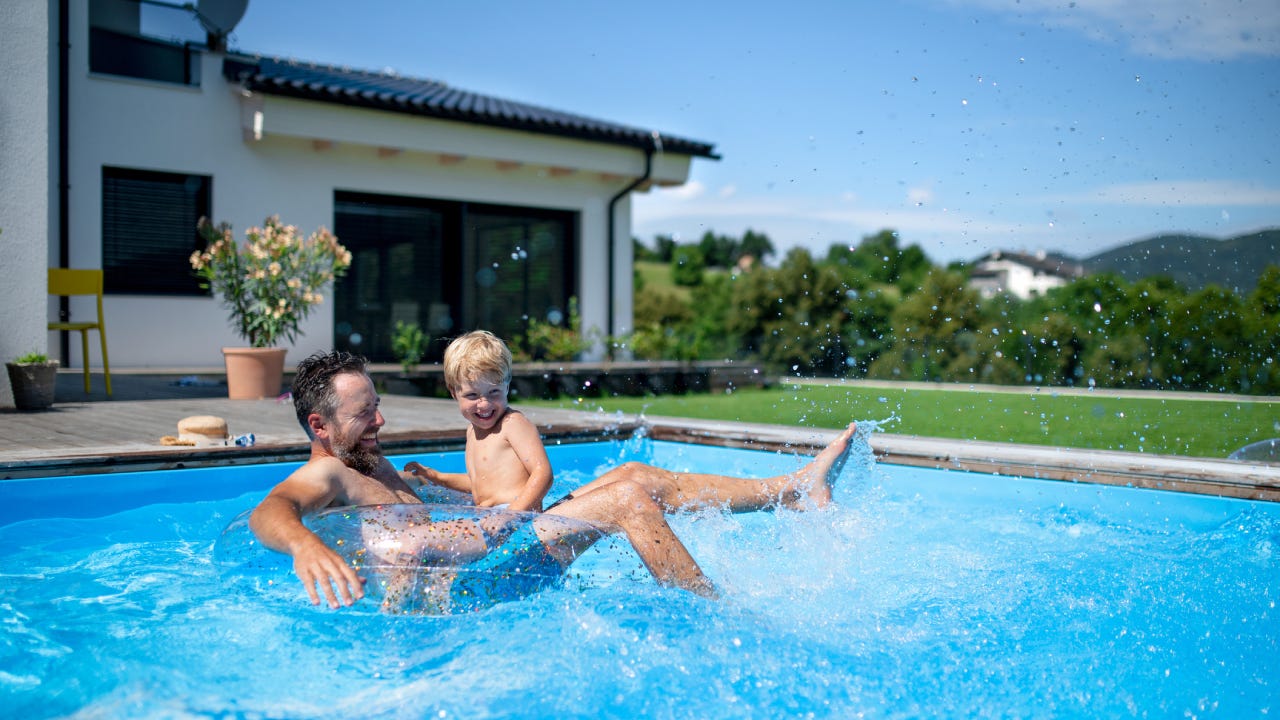Owning a house with a swimming pool is a dream for many homeowners in the USA. A pool can be a great place for relaxation, exercise, and family fun. But at the same time, it also comes with more responsibilities and higher risks. If you own a home with a pool, you need to think carefully about homeowners insurance for houses with swimming pools. Insurance protects you financially in case of accidents, injuries, or property damage related to your pool. In this guide, we will explain why homeowners with pools need special insurance, how it works, what coverage you should look for, and how to save money on your premium.
Why Do You Need Homeowners Insurance for Swimming Pools?
A swimming pool increases the value of your home, but it also increases risks. Insurance companies see pools as an “attractive nuisance.” This means they are fun and attractive, but they also create danger, especially for children or guests. Accidents such as slips, falls, or even drowning can happen. Without the right insurance, you could face very high costs from medical bills or legal claims.
For example, if a guest slips near your pool and gets injured, you may be responsible for paying for their treatment. If a neighbor’s child sneaks into your yard and gets hurt, you could face a lawsuit. With the right homeowners insurance for pools, these risks are covered, and you are financially protected.
Does Standard Homeowners Insurance Cover Swimming Pools?
Most standard homeowners insurance policies do cover swimming pools, but the level of coverage can vary. Usually, pools are considered part of your home’s “other structures,” like a garage or fence. This means your insurance will protect the pool against damage caused by events like fire, storms, or vandalism. However, coverage may not include wear and tear or damage caused by lack of maintenance.
Another important part is liability coverage. Standard policies usually include liability protection, which covers you if someone gets injured on your property. Since pools increase the chance of accidents, it’s smart to have higher liability limits. Some homeowners even add an umbrella insurance policy to provide extra protection beyond the normal coverage limits.
Types of Coverage You Need for a House with a Pool
When buying homeowners insurance for houses with swimming pools, it’s important to understand the main types of coverage:
1. Property Coverage
This protects the pool itself if it gets damaged by a covered event, like a storm or falling tree. For example, if strong winds blow debris into your pool and cause damage, property coverage may help pay for repairs.
2. Liability Coverage
This is the most important type of coverage for pool owners. It covers legal fees, medical bills, and damages if someone gets injured or dies in your pool. Since pool accidents can lead to expensive lawsuits, experts recommend at least $300,000 to $500,000 in liability coverage.
3. Medical Payments Coverage
This pays for minor medical expenses if someone is hurt on your property, even if you are not at fault. It’s helpful for small accidents like cuts, bruises, or slips around the pool area.
4. Umbrella Policy
An umbrella policy gives extra protection if your liability coverage is not enough. For example, if your liability coverage is $500,000 but a lawsuit costs $1 million, your umbrella insurance can cover the extra $500,000. Pool owners often buy umbrella policies for added safety.
Factors That Affect Insurance Costs for Pool Owners
The cost of homeowners insurance with a pool depends on many factors. Insurance companies look at your pool type, safety features, and overall risk before deciding your premium. Here are some common factors:
- Type of Pool: In-ground pools are usually more expensive to insure than above-ground pools because they cost more to repair or replace.
- Safety Features: Pools with fences, locked gates, covers, or alarms are considered safer and may lower your insurance cost.
- Location of Your Home: States with higher accident rates, lawsuits, or storm damage risks may have higher premiums.
- Liability Limits: Choosing higher liability coverage will increase your premium, but it also gives you more protection.
- Home Value: Since a pool increases your home’s value, it may raise your overall insurance costs.
Safety Measures That Can Lower Your Premium
Insurance companies like homeowners who take safety seriously. By adding safety features, you may reduce your risk and get discounts on your policy. Here are some tips:
- Install a strong fence with a locked gate around the pool.
- Use a pool cover when the pool is not in use.
- Add pool alarms that alert you if someone enters the water.
- Keep rescue equipment and first aid kits nearby.
- Never leave children unattended near the pool.
By showing your insurance provider that your pool is safe, you may qualify for better rates on your home insurance with a swimming pool.
Common Exclusions in Pool Insurance Coverage
Even though homeowners insurance covers pools, there are some exclusions you should know:
- Negligence or Poor Maintenance: If your pool gets damaged because you did not maintain it, insurance will not pay.
- Earthquakes or Floods: Standard policies usually do not cover pool damage from earthquakes or floods. You may need separate coverage.
- Diving Boards and Slides: Some insurers refuse to cover pools with diving boards or slides because they increase the risk of accidents.
Always check your policy carefully to understand what is included and what is not.
Tips for Choosing the Best Homeowners Insurance for Pools
If you are buying or updating homeowners insurance for houses with swimming pools, here are some tips to help you:
- Compare Different Insurance Providers – Get quotes from multiple companies to find the best coverage at the best price.
- Ask About Liability Limits – Make sure your policy includes enough liability coverage to protect against lawsuits.
- Add an Umbrella Policy – This is highly recommended for pool owners. It gives you extra protection.
- Check Safety Requirements – Some insurers may require certain safety features, such as fences or alarms.
- Review Your Policy Every Year – As your pool ages or your home value changes, update your coverage to stay fully protected.
How Much Does Homeowners Insurance Cost for a House with a Pool?
On average, adding a pool to your home can increase your homeowners insurance premium by $50 to $100 per year. The actual cost depends on your location, the pool type, and your coverage limits. For example, an in-ground pool with no safety features in a high-risk state will cost more to insure than an above-ground pool with a fence and cover in a low-risk area.
Even though insurance may cost more, it is worth it for the protection it provides. Without coverage, one accident could cost you thousands of dollars in medical bills or legal fees.
Conclusion
A swimming pool is a great feature that adds fun, beauty, and value to your home. But it also comes with more risks and responsibilities. That’s why homeowners insurance for houses with swimming pools is so important. With the right coverage, you can enjoy your pool without worrying about accidents, damage, or lawsuits. Make sure you understand your policy, add enough liability protection, and take safety measures to reduce risks. By doing this, you can protect your family, your guests, and your financial future.
FAQs
1. Does homeowners insurance cover pool accidents?
Yes, most homeowners insurance policies cover pool-related accidents under liability coverage, but you may need higher limits for better protection.
2. Do I need extra insurance if I have a swimming pool?
It’s not required, but adding an umbrella policy or increasing liability limits is strongly recommended for pool owners.
3. Are above-ground pools covered by insurance?
Yes, most policies cover above-ground pools, but coverage may depend on whether the pool is permanent or temporary.
4. Will my premium go up if I add a pool?
Yes, usually your premium will increase slightly because pools add more risk.
5. Can I lower insurance costs for my pool?
Yes, by adding safety features like fences, covers, and alarms, you can reduce risks and sometimes get discounts on your insurance.







